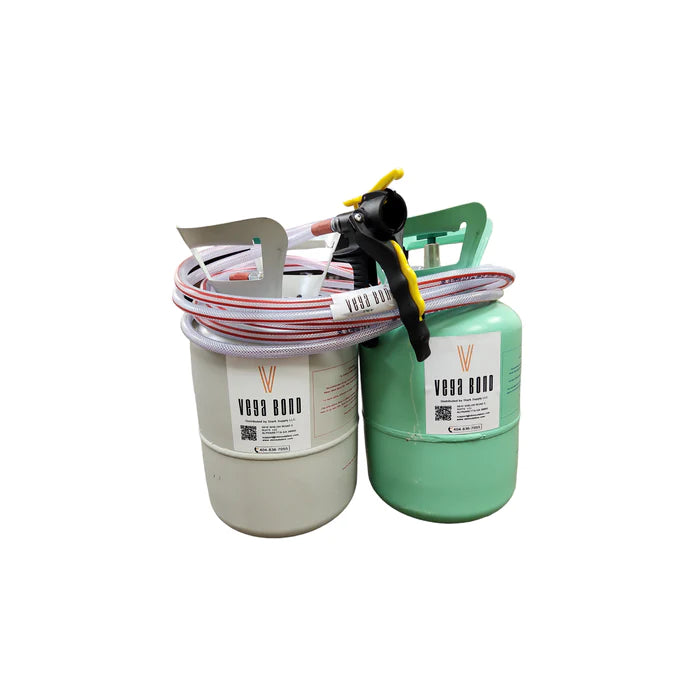When it comes to insulating your basement, you want a solution that provides effective insulation and long-term benefits. That's where spray foam insulation comes in. But is spray foam insulation the best choice for basements? And what benefits does it bring? Let's find out.
Understanding the Benefits of Spray Foam Insulation
When it comes to insulating your basement, spray foam insulation offers impressive benefits that make it a superior choice. Let's explore why spray foam insulation is preferred for improving basement energy efficiency, enhancing comfort, and providing long-lasting insulation.
Read More: Benefits of Spray Foam Insulation
Spray foam insulation is highly regarded for its exceptional thermal performance. It effectively seals any gaps or cracks in your basement walls, floors, and ceilings. This airtight seal prevents air leakage, minimizing drafts and heat loss. Reducing your heating and cooling costs can lead to significant energy savings.
Using spray foam insulation helps maintain a consistent temperature in your basement. This means you can enjoy a more comfortable living space, free from cold spots or excessive heat. Whether using your basement as a living area, home office, or storage space, spray foam insulation ensures a comfortable environment.
Read More: Cost to Insulate Basement
One key advantage of spray foam insulation is its ability to create a moisture barrier. By sealing out moisture, spray foam can help prevent water damage, mold growth, and the development of musty odors in your basement. This benefit is essential for damp basements or areas prone to high humidity.
Superior Insulation for Long-term Benefits
Unlike traditional fiberglass or cellulose, spray foam insulation does not sag or settle over time. It retains its shape and effectiveness for the long haul, ensuring your basement remains adequately insulated for years.
Also, spray foam can help improve your basement's overall structural integrity. It reinforces the strength of your walls and can act as a sound barrier, reducing noise transmission from outside sources.
Read More: How long does spray foam last?
Overall, the benefits of spray foam insulation for basements are undeniable. From optimizing energy efficiency and enhancing comfort to providing superior insulation and moisture resistance, spray foam is the ideal choice for homeowners looking to upgrade their basement insulation.
Spray Foam Insulation vs. Traditional Insulation in Basements
When it comes to insulating your basement, you have several options. One of the most debated choices is between spray foam insulation and traditional methods. Let's explore the pros and cons of each to help you make an informed decision.
Spray Foam Insulation:
Spray foam insulation is a popular choice for basement insulation due to its exceptional properties. It comprises a combination of chemicals that expand and harden upon application, creating a continuous and airtight barrier. This type of insulation offers several benefits:
- Superior insulation: Spray foam insulation has a higher R-value, which measures thermal resistance, than traditional insulation. Methods. This means it can effectively reduce heat transfer, keeping your basement warmer in winter and cooler in summer.
- Energy efficiency: Spray foam insulation's airtight seal prevents air leakage, reducing energy loss from your home. Implementing this approach can substantially reduce your heating and cooling expenses.
- Moisture resistance: Spray foam insulation repels moisture, preventing the growth of mold and mildew. This is especially beneficial for basements, which are prone to dampness.
- According to some manufacturers, spray foam insulation can last the life of the building, exceeding the longevity of traditional insulation.
Despite its advantages, spray foam insulation also has a few drawbacks. It can be more expensive than traditional insulation methods, and the installation process requires the expertise of a professional contractor.
Traditional Insulation:
Traditional insulation methods, such as fiberglass or cellulose, have been used for many years and are still widely used in basements. These insulation options have their own set of advantages and disadvantages:
- Lower cost: Traditional insulation methods are generally more cost-effective than spray foam insulation, making them a popular choice for homeowners on a budget.
- DIY-friendly: If you have the necessary skills and knowledge, traditional insulation can be installed as a DIY project. This can further reduce costs.
- Availability: Traditional insulation materials are readily available in most home improvement stores, making them easily accessible for homeowners.
- Potential air leakage: Traditional insulation methods may not provide an airtight seal, which can lead to air leakage and energy loss. Additional measures, such as sealing gaps and using a vapor barrier, are often necessary.
- Vulnerable to moisture: Traditional insulation materials, mainly fiberglass, can absorb moisture, leading to mold and mildew growth if not adequately addressed.
Read More: Spray Foam Insulation Cost
Conclusion
After exploring the benefits and comparison of spray foam insulation for basements, it is clear that it offers several advantages over traditional insulation methods. One crucial factor to consider is the cost of spray foam insulation for basements. While it may have a higher upfront cost than other options, the long-term energy savings and improved comfort make it a worthwhile investment.
The installation process of spray foam insulation requires professional expertise to ensure proper application and optimal results. It is recommended that you hire experienced contractors who can assess your basement's unique needs and provide a tailored solution.
For those seeking effective basement insulation solutions, spray foam insulation is an excellent choice. Its ability to create an airtight seal and provide superior insulation surpasses that of other materials. Additionally, the closed-cell structure of spray foam insulation helps mitigate moisture and prevent the growth of mold and mildew, making it an ideal solution for damp basements.
Reviews of spray foam insulation in the basement have been overwhelmingly positive. Homeowners have reported significant energy savings, improved comfort, and reduced noise transmission. Spray foam insulation is praised for its versatility and effectiveness in various climates and conditions.
FAQ
Is spray foam insulation good for a basement?
Yes, spray foam insulation is an excellent choice for basements. It provides superior insulation to traditional methods and helps create a more comfortable and energy-efficient space.
What are the benefits of spray foam insulation?
Spray foam insulation offers several benefits for basements. It improves energy efficiency, reduces air and moisture infiltration, provides sound insulation, and helps to prevent mold and mildew growth.
How does spray foam insulation compare to traditional insulation in basements?
Spray foam insulation outperforms traditional insulation options in basements. It forms an airtight seal, creating a barrier against drafts and moisture, which can be challenging with other insulation types. Additionally, spray foam insulation provides better insulation value and is more versatile, making it an ideal basement choice.
What are the available options for basement insulation?
Spray foam insulation is considered one of the best options for basement insulation. Other alternatives include fiberglass batt insulation, rigid foam, and blown-in insulation.
Can I install spray foam insulation in my basement myself?
While it is possible to install spray foam insulation in your basement yourself, it is generally recommended that you hire a professional. Proper installation requires specialized equipment and expertise to ensure optimal results and safety.
How much does spray foam insulation for a basement cost?
The cost of spray foam insulation for a basement can vary depending on factors such as the area's size, the insulation's thickness, and the location. It is best to consult with insulation contractors to get accurate cost estimates tailored to your specific requirements.
What is the installation process for spray foam insulation in a basement?
The installation typically involves:
- Cleaning and preparing the basement walls.
- Applying a protective layer.
- Spraying the foam insulation onto the desired areas.
After the foam expands and cures, it is trimmed and ready for use.
Are there any other solutions for basement insulation?
In addition to spray foam insulation, other solutions for basement insulation include insulating basement walls with rigid foam panels, using insulated concrete forms (ICFs), and applying reflective foil insulation.
What do people say about spray foam insulation for basements?
The reception and reviews of basement spray foam insulation have generally been joyous. Many homeowners have reported improved comfort, energy savings, and reduced moisture issues after installing it.



